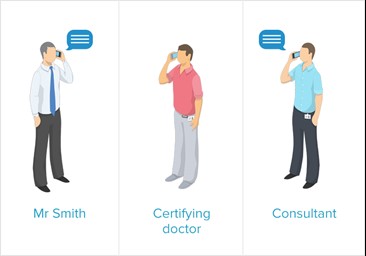MCCDs are selected randomly for review either at the point of registration (for paper MCCDs) or when electronically completed and transferred to the registrar (eMCCDs).
Guide to Death Certification Review in Scotland
Contact details for the Death Certification Review Service
Types of review
There are two main types of review - level 1 and level 2. Both levels of review have the same aim: to improve the quality of the MCCD process, to reassure the public and to deter poor practice. It is anticipated that approximately 10% of all deaths, not reported to the Procurator Fiscal, will be subject to a level 1 review per year and a minimum of 1,000 deaths to a level 2 review.

In the shorter level 1 review the Medical Reviewer will check the MCCD cause of death and speak to the certifying doctor about anything unusual. If the certifying doctor is unavailable or incapacitated, the Medical Reviewer will discuss the MCCD with the consultant in charge of the case or another member of the team who knew the deceased and / or has access to the clinical records.
A level 2 review is similar to a level 1 in that the Medical Reviewer will check the MCCD and speak to the certifying doctor. However, in addition, for a level 2 review the Medical Reviewer will also consider relevant documents associated with the death, including appropriate health records and the results of any clinical investigations with this being done electronically if at all possible. The Medical Reviewer may also discuss the case with other relevant clinical and health care staff and the family or informal carer of the deceased. Other evidence may also rarely be considered, such as viewing the body.
These review types will be conducted through a random selection process, will be available on request in certain circumstances from interested persons, or may be targeted by Medical Reviewers in response to any emerging pattern that requires further checks.
It is anticipated that in the vast majority of cases the standard review procedure will be appropriate and the one to three day extension to the registration procedure will not add any significant delay to the funeral arrangements. However, an advance registration procedure will be available in specific circumstances where an informant has a clear rationale for a funeral to proceed within a quicker time scale.
The three categories considered appropriate are:
-
Religious or cultural reasons – for example, some religious traditions require burial within 24 hours and some communities have a tradition of burial within three days
-
Compassionate reasons – for example, in the death of a child under 16 years or other circumstances where a delay may cause significant additional distress
-
Administrative or practical reasons – for example, where the family does not reside in Scotland and the deceased will be in transit to another part of the UK or international destinations for a funeral; or where the body is being donated to medical research and has to be preserved quickly.
If one or more of the eligibility criteria are satisfied then the Medical Reviewer may agree to allow the registration to proceed before the review is complete. Effectively this means that the body can be released and the funeral can proceed while the review takes place in the background. It is expected that the decision should be made within two working hours and within that same working day.
If the advance registration is not granted, the Medical Reviewer will communicate this back to the Registrar, with the reasons, and the original review will proceed as normal. There is no route of appeal for the Medical Reviewers decision following consideration of an advance registration request. All requests– whether granted or not granted – will be peer reviewed regularly by the Medical Reviewers to ensure consistency and quality.